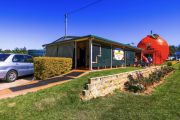
Caltex to spin off petrol stations into property trust
Fuels supplier Caltex’s plan to spin off stakes in a portfolio of 250 petrol station sites could create the local bourse’s third such property trust with an initial market cap of around $700 million.
The spin-off plan follows a review of its real estate holdings which Caltex launched in August. From that, 50 sites have already been earmarked for divestment, while Caltex has drawn a ring around 500 sites it regards as core.
Of that total, the fuels giant holds the freehold for half, or 250 sites. The plan is to move those 250 sites into an unlisted property fund, with 51 per cent held directly by Caltex. The remaining 49 per cent would be held in a real estate investment trust which would likely list on the Australian Securities Exchange in the first half of next year.
Rent from the 250 sites would come in at $80 to $100 million annually, suggesting the freehold portfolio would be worth as much as $1.8 billion, according to industry estimates.
Half the freehold ownership goes into a listed trust, giving it a portfolio value of around $900 million. Factoring in gearing, equity issuance could be in the $600-$700 million range.
There’s also the prospect that Caltex itself, while holding 51 per cent of the freehold sites directly, could also take up a stake in its listed co-owner, potentially trimming the required capital raise to within the $500 million range.
Caltex has appointed UBS and Grant Samuel as its financial advisers with UBS as lead manager for the proposed IPO. Herbert Smith Freehills as legal adviser.
Early expectations are for a dividend yield from the mooted petrol station trust of between 5 per cent to 6 per cent.
The prospect of that level of yield – at a significant spread to the risk-free rate of return on cash – plays to a dominant theme in the commercial property sector in recent months, as the lower-for-longer investment environment prevails.
“The primary attraction is the hunt for yield in the market at the moment, the Caltex brand, the core nature of these sites: [this] means they are highly attractive to the equity market when we look at where that cycle is at the moment,” Caltex chief financial officer Matt Halliday told The Australian Financial Review.
A similar strategy has been deployed out by other companies this year, including Telstra and Arnotts, which have looked to capture pent-up demand for long-hold, steady-return property assets by carving off parts of their real estate book.
In August, Telstra sold a $700 million stake in a newly created property trust through UBS to a consortium of investors led by ASX-listed fund manager Charter Hall. The portfolio will be valued at an implied rental yield of 4.4 per cent.
Meanwhile, KKR has brought in real estate firm CBRE and UBS to sell Arnotts’ property portfolio in a mooted $800 million sale and leaseback deal.
Caltex could potentially hold a stake in the listed property trust, a move which would add support to the prospective IPO. Mr Halliday said the board would consider that upon a final decision, although he thought it unlikely Caltex would maintain a position in the new REIT over the medium to long term.
The proposed property trust would join existing petrol station-based REITs, including the $2 billion Viva Energy REIT and the $300 million APN Convenience Retail REIT.
Lease terms could be as long as 15 years and there would be an immediate path to growth with the property trust in prime position to take over the freehold of the remaining Caltex-occupied sites, which are held by a range of landlords.
“It provides a very attractive vehicle to bring some of the other 250 leasehold sites into the network at some point in time in the future,” Mr Halliday said.
Meanwhile, the $100 million-plus direct divestment of 50 sites which Caltex has identified as being better suited to other uses is picking up pace. Bids have been received on the first 25-site tranche of that sell-down.











